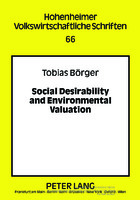Social Desirability and Environmental Valuation
Abstract
Socially desirable responding (SDR) is an often-reported source of bias in survey interviews. It describes the tendency of a respondent to answer in a way that is socially desirable rather than to answer truthfully. This response bias also threatens the reliability and validity of survey-based environmental valuation techniques such as the Contingent Valuation Method (CVM). Therefore, the study deals with the assessment of the conditions for the occurrence of SDR in CVM interviews. A behavioral model is devised to take into account a set of factors triggering SDR responses. The impact of these factors of SDR on willingness to pay (WTP) responses is tested. The results reveal that the relevant factors do not affect WTP statements simultaneously but rather influence them in an independent manner. These findings can improve future CVM studies by identifying respondents who are prone to be influenced by SDR.
Keywords
Biodiversity preservation; Börger; China; Contingent Valuation Method (CVM); Desirability; Environmental; Response bias; Social; Survey methodology; Valuation; Welfare measurement; YunnanDOI
10.3726/978-3-653-01583-6ISBN
9783653015836OCN
818875318Publisher website
https://www.peterlang.com/Publication date and place
Bern, 2012-07-24Series
Hohenheimer volkswirtschaftliche Schriften, 66Classification
Sociology and anthropology
Psychology
Behavioural economics
Environmental economics


 Download
Download